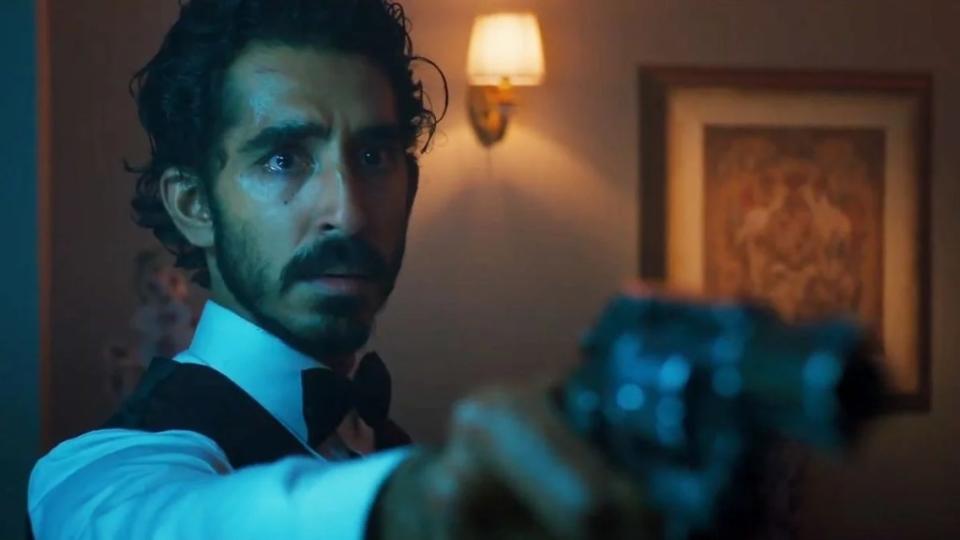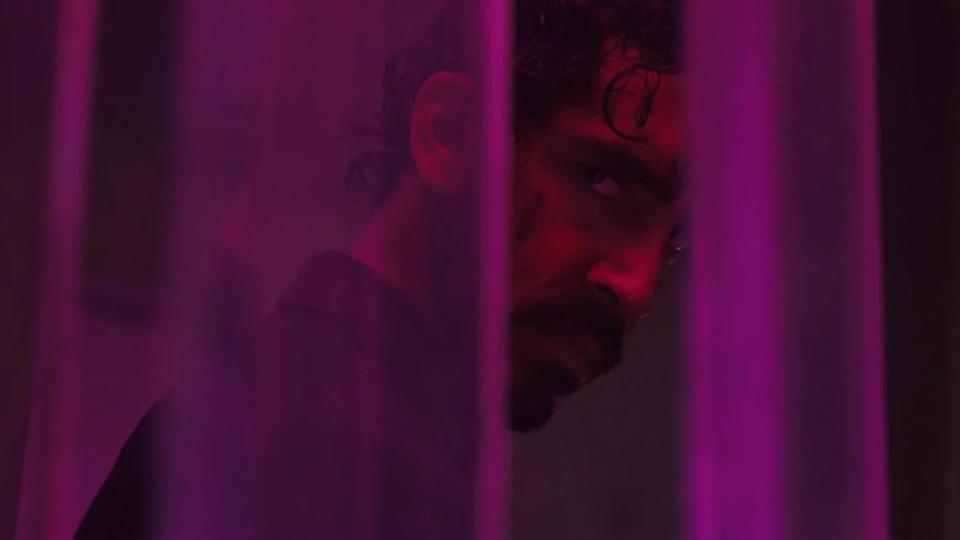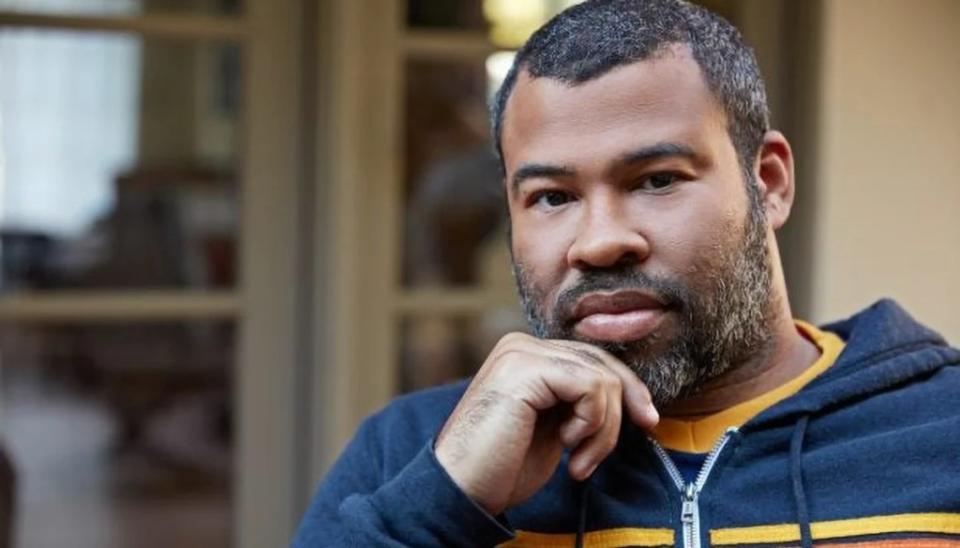How ‘Monkey Man’ Went From Netflix Roadkill to Universal’s Theatrical Event
- Oops!Something went wrong.Please try again later.
Dev Patel’s directorial debut, “Monkey Man,” is one of the must-see movies of the spring, and it’s easy to see why. Universal Pictures’ high adrenaline, hard-edged action release, which hits 3,000 screens this weekend, has one of the coolest trailers of the year and received a rapturous response when it premiered at the South by Southwest Film Festival last month, where video quickly circulated of Patel moved to tears by a standing ovation.
But the English-language, Indian cast movie almost never made it here. The independent feature was bought for $30 million during production by Netflix, which then dropped the film without giving a clear reason why. People familiar with the film say its political undertones may have spooked the streamer. Suddenly orphaned, “Monkey Man” was headed to festivals to seek a buyer when director Jordan Peele saw it and convinced Universal Pictures to buy and distribute the movie.
“I first saw a cut of ‘Monkey Man’ about eight months ago and I instantly knew it was a classic,” Peele told TheWrap. “I’ve been a fan of Dev’s for a while, but I was instantly blown away by the cinematic generosity of his film. I watched it alone but could hear the audience’s reactions in my head. I knew the movie demanded a theatrical run.”
Patel recalled the shock of hearing from Peele while still reeling from the Netflix blow. “I’m licking my wounds and doing a low-budget horror film in the countryside of England,” he said in a conversation with Peele. “And I get this call that Jordan has seen it, he wants to talk to you. Today. We got on the phone and the first thing you said was, ‘Tell me everything.’ We spoke for three hours. It was like a therapy session for me.”
“Monkey Man” is now getting the large theatrical exhibition that it probably should have always had in the first place. Universal estimates it will take in $12 million this weekend headed for a “John Wick”-style audience, more than the $9 million it paid for the film.
“Monkey Man” follows an unnamed young man (played by Patel) in contemporary India who vows revenge against those responsible for his mother’s death. He takes part in underground boxing matches, where he unceremoniously gets his ass kicked, and slowly works his way up the hierarchy of Indian society to get to those he wants dead. Along the way, he suffers a serious setback but is aided by a group of trans warriors.
The film, packed with violent fight scenes, is bathed in kaleidoscopic colors and flourishes borrowed from earlier Patel collaborators like Danny Boyle (including several scenes depicting the Dickensian underground of India that call to mind sequences from “Slumdog Millionaire”) and Neill Blomkamp (like the strategic use of South African star Sharlto Copley). But Patel, as a filmmaker, makes “Monkey Man” his own. It’s enough to wonder how anyone could have second-guessed much less completely abandoned his vision.

“Monkey Man” begins
“Dev first pitched us on the idea years ago when we worked with him on ‘Hotel Mumbai.’ He grew up hearing about Hanuman in Hindu epics as a boy and wanted to make an action movie inspired by Hanuman,” said Erica Lee, a partner at Thunder Road Films and one of the movie’s producers.
“The story for ‘Monkey Man’ was deeply personal to him but has universal themes that really resonated with us.” Hanuman is a deity in Hinduism and is the companion to Rama. He is also a divine monkey, often depicted as having a monkey face. He is also described as a warrior.
In “Monkey Man,” Patel’s character is read the stories of Hanuman as a child. When he grows up and decides to take revenge, he uses the iconography of Hanuman, almost as his alternate identity. (He also wears the monkey mask in the ring, when he’s taking part in underground boxing matches.)
Action films like “John Wick” are Thunder Road’s “bread and butter,” according to Lee. “But the world that Dev built and the film’s setting – the underbelly of India – was something we had not seen or explored before, and that was really exciting,” Lee said.
Thunder Road also was eager to support Patel’s directorial debut. “We’ve known each other for a long time,” Lee said. “He is such an incredible creative, and to be able to go through this filmmaking process with him and see him grow has been really amazing to be a part of.”
Lee said that Thunder Road had originally envisioned “Monkey Man” for a theatrical release, for obvious reasons. “Action movies just play well on a big screen and the adrenaline is just that much more heightened when you go to see them in a theater,” Lee said. She also added that Patel’s vision was “well suited for a theatrical viewing experience.”
Thunder Road sold the movie to Netflix when production was underway. Lee said they didn’t start production as a “for streaming” movie. Thunder Road’s objective is to “make really great films that we believe in and that audiences will love,” regardless of if it’s a streaming or theatrical project. “As production and post-production progressed, the film kept evolving, and ultimately, we and the filmmaking team and Netflix all realized it wasn’t the right fit for this project,” Lee said.
Just like that, a movie that had a healthy budget of around $10 million, and guaranteed distribution, was back on the market. One of the messages of “Monkey Man,” though, is don’t discount the underdog.

Dropped
While Lee said that it was a mutual decision between Netflix and Thunder Road, there is something else going on with “Monkey Man” that could have led to it being dropped by the streamer: The movie’s political content.
In his review of “Monkey Man” out of South by Southwest, critic Siddhant Adlakha wrote that the film’s villain “ends up a half-hearted metaphor for India’s contemporary, right wing Hindutva government: He reads like a stand-in for politician and religious fanatic Yogi Adityanath with hints of Modi-esque industrial string-pulling.”
Hindutva is a political ideology that justifies Hindu nationalism and the establishment of Hindu hegemony within India. Adityanath, a Hindu monk, is the chief minister of Uttar Pradesh, India’s most-populous state. His conservative government has ordered the withdrawal of some 20,000 investigations, including those where he and other politicians were targets. Navendra Modi, India’s prime minister since 2014, is consistently popular in polls but the country under his tenure has experienced a weakening of democratic institutions, freedom of expression and individual rights. His government implemented a 2019 citizenship law that excludes Muslims, which led to deadly riots the next year.
Patel’s character sometimes uncomfortably falls into a similar category as Adityanath and Modi. Adlakha wrote that “the language and imagery adopted by Patel’s character fall discomfortingly in line with Hindutva itself.” (The stories that inspired Patel, and his character, also have a queasy history, as Adlakha also pointed out.)
When the first trailer for “Monkey Man” was released, the posters for the villain were saffron orange, a color that represents Hinduism and also Hindu nationalism. But before the movie premiered in Austin, the color of the posters had been changed to red, removing the connection between the villain and Hindutva.
Netflix is desperately trying to gain ground in India, the world’s most-populous country. TheWrap reported earlier this week about how it has lost ground in that critical growth market. While Amazon has managed to defend its share of streaming original content there, Netflix’s share of demand in India has slid for the last three years and accelerated through most of 2023, according to Parrot Analytics. It dropped from a high of 41% in January 2023 to 30% in October, recovering slightly in the final two months of the year.
“Netflix is a cautionary tale for what can happen if a platform is unable to keep pace with the competition for audience attention,” contributor Christopher Hamilton from Parrot Analytics wrote.
It’s enough to make you wonder how concerned Netflix was about streaming a movie that openly confrontational about the region’s politics.
Netflix didn’t respond for comment about the flags. Universal did not comment.
Back from the Dead

With the film now on the free market, Thunder Road arranged for it to debut at the Toronto International Film Festival last fall. This would be the splashy premiere that the production needed, Lee explained. Maybe it could generate some awards buzz while they were at it. (Patel’s “Slumdog Millionaire,” for context, won the People’s Choice Award at Toronto before becoming an Oscar frontrunner, eventually winning six trophies including Best Picture and Best Director for Boyle.)
But then somebody saw “Monkey Man” before the Toronto screening was scheduled to take place, fell in love with the film and signed on as a producer. That somebody was Jordan Peele.
I was instantly blown away by the cinematic generosity of his film. I watched it alone but could hear the audience’s reactions in my head. I knew the movie demanded a theatrical run.
director Jordan Peele
Peele said that immediately after watching the film, he and his Monkeypaw Productions team took it to Universal, “who knows how much we love audience-pleasing genre films that come from unexpected perspectives. They saw what we saw and moved quickly to acquire the movie.”
Then, Universal and Peele reached out.
Right off the bat, Lee said, Peele and the Monkeypaw team “saw the vision.” The Oscar-winning “Get Out” filmmaker was “instrumental” in brokering the deal with Universal and sharing the excitement he had with the studio (who “connected with it” as well). “He was such a champion for the film and is the reason that Universal became interested initially and ultimately acquired it as part of their deal with Monkeypaw,” Lee said.
Universal set a spring theatrical release date and “immediately after the deal closed” targeted South by Southwest as the ideal premiere, said Lee. (Universal has had great success premiering everything from Judd Apatow’s “Knocked Up” to Peele’s own “Us” at the Austin festival.)
“We had to move quickly to finish the film,” Lee said. “Dev is a perfectionist in the best way possible and had a very specific vision for ‘Monkey Man,’ so we worked until the last moment to fully realize that vision.”
And Peele was right there with them, working to complete the film. “We advised him in the edit process and supported his vision until he completed it,” Peele said. “This included the cut, color, sound, and music.”
The movie finished just days before its premiere at South by Southwest. That standing ovation in Austin was the earned reward for the work they put in.
The producers are understandably excited that “Monkey Man” is finally coming out and that audiences can experience the way it was meant to be seen.
“The world we created is very different – you can feel the grit of the city, the fights become visceral, and it’s almost like you are in the ring with Kid, which is so captivating and what you strive to create with a film like this,” Lee said.
“I’m thrilled for movie fans,” Peele said. “Dev has put his heart and soul into a film that truly slaps. The emotionally charged underdog story feeds the action which sparks audience reactions so explosive you’ll hear it in the next theatre.”
That’s right: You aren’t safe watching “Ghostbusters: Frozen Empire.” “Monkey Man” is coming for you.
The post How ‘Monkey Man’ Went From Netflix Roadkill to Universal’s Theatrical Event appeared first on TheWrap.

